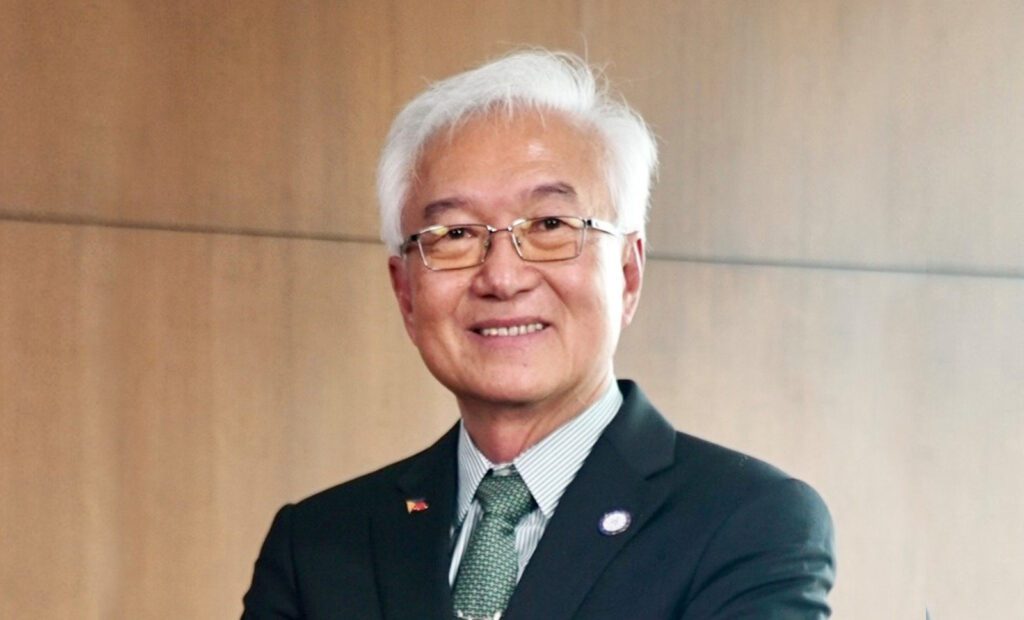
Simplicio “Jun” Umali Jr. is the President and CEO of Gardenia Philippines, one of the few professional CEOs who has maintained his position for the past 25 years. Under his leadership, Gardenia has become the dominant market leader in the bread category in retail stores and a household name in the Philippines, maintaining strong customer loyalty despite competitors offering lower prices. In this interview, he shares his insights on marketing fundamentals and the connection between operational excellence and competitive strategy.
Q1. Gardenia’s logistics system is one of its major strengths. Given the inherent challenges of bread’s short shelf life, how have you integrated advanced logistics management, inventory optimization, and predictive demand forecasting to not only ensure product freshness but also minimize operational costs across a growing market?
A1: Gardenia’s unique Distribution and Logistics system allows us to deliver bread daily to retail outlets to ensure the availability of freshly baked bread to consumers. Our extensive network of trucks serves the same stores multiple times a week, delivering fresh bread from the strategically located factories. To ensure only fresh stocks are available for sale, they pull out any unsold breads every delivery day. Unlike competitors who keep their breads on store shelves for 5 to 7 days, Gardenia can guarantee freshness with this unique daily distribution system.
With our plants operating 24 hours, our logistics system ensures continuous product movement, reaching as far north as Ilocos and Cagayan Valley, as far south as the Bicol region, and extending to the islands of the Visayas and across Mindanao. We utilize big “feeder” trucks that transport products overnight and transfer these to our route delivery teams in far-flung areas and islands so they may start delivering to stores by daybreak. This is a daily operation, unique to us, designed to keep up with Gardenia’s fresh bread policy.
The big challenge with this logistics system is predictive demand forecasting by store. We developed a Sales Force Automation system with software that helps us determine what needs to be delivered to every store by our sales and delivery crews, ensuring product availability daily and minimizing costly unsold bread pullouts.
This system transfers data to our sales and logistics team’s digital tablets that help indicate what to deliver to their outlets when covering their route every day. These tablets are also devices used for invoicing (with handheld printers) and are connected online to our central computer system to help predict the next day’s deliveries.
Q2. As Gardenia continues to scale, particularly in new markets, what operational challenges arise in maintaining the same level of efficiency and consistency in your logistics? How do you strategically balance this while ensuring sustainability and cost-effectiveness?
A2: A significant logistics challenge is the need to invest in more trucks to serve smaller stores that will allow us to expand market reach, saturate existing markets, and cover the countryside. To address this, Gardenia expanded its distribution network by establishing local distributors who use their own fleet of mini Gardenia delivery trucks to serve sari-sari stores, groceries, wet markets, and variety stores.
These distributors cover areas with narrow congested roads in highly populated urban communities, remote rural barangays, islands, and upland regions more cost-effectively. They are trained to adhere to Gardenia’s delivery practices – ensuring product freshness and consistent customer service standards.
Q3. Brand loyalty is a key pillar of Gardenia’s market dominance. Could you share the consumer insights, marketing strategies, or innovations that have been most instrumental in sustaining this loyalty, even in the face of lower-priced competitors?
A3: Gardenia’s brand loyalty stems from our commitment to consistent product quality and continuous innovation.
Gardenia bread is known for its softness, aroma, taste, nutrition, and freshness—qualities that resonate strongly with our customers. This consistency is achieved through world-class, fully automated production facilities, where bread is produced untouched by human hands. We showcase this by allowing plant tours in our factories. In 2024 alone, over 300,000 students and individuals toured our factories, further reinforcing trust in our processes and products.
We also market a wide range of products. These include health-focused options like high-fiber wheat bread and wheat raisin loaf, as well as flavored loaves, snacks, buns, and toasts.
Our marketing strategies amplify these strengths. We engage consumers through various channels, including advertising, events, outdoor media, digital campaigns, and point-of-sale initiatives with the help of merchandizers. We also have value-adding programs such as product bundling, price discounts, and buy-one-take-one promotions that further enhance customer delight.
While some consumers may occasionally shift to lower-priced options, many return to Gardenia for the consistent quality and reliability they know and trust as monitored by our quarterly consumer satisfaction research.
Q4. What lessons were learned from the market dynamics that led to the entry and exit of major competitors in the supermarket bread segment? How has this shaped your strategic outlook?
A4: There will always be larger players ready to challenge a market leader. One has to stay vigilant, innovative, and ready to fight it out and win in the marketplace. We have faced competition from foreign brands and local challengers from much bigger companies with a lot of resources. While competition presents a challenge, it also creates opportunities for market growth. The increased noise from their marketing efforts often benefits the market leader. With competition, we become better, sharper, more innovative, and more hardworking. This keeps the Passion in our organization burning as we Innovate to achieve higher levels of Excellence with Speed – our PIES. This way, we continue to increase our market share in a growing market, despite increased competition.
Anticipation of the entry and challenge of major competitors make us initiate preemptive moves to counter their efforts in winning the hearts and minds of consumers. We expanded our product offerings to include health breads, flavored bread, and snack products.
For instance, in addition to our fast growing High Fiber Wheat bread in the premium health category, we launched our wheat raisin loaf, cranberry loaf, and our newest sourdough loaf called HealthiGrain® Multigrain Loaf. In the snack sector, our Butter Toasts and Cream Rolls are taking the market by storm.
In the price-sensitive market, and to challenge competitors targeting the lower-priced sector, we introduced a second brand, Neubake. It offers significantly lower-priced options in the white loaf and wheaten bread categories, featuring a taste and softness profile favored by the market. In fact, our own Neubake brand is now a major competitor to Gardenia while it kept other competitor brands more challenged.
Our fast-tracked preemptive sales, distribution, and marketing strategic efforts in the light of increased competition made us enter more market segments including the price-sensitive lower-income consumer markets.
Q5. In provincial cities, consumer behavior and brand loyalty can significantly differ from urban centers. How does Gardenia localize its strategy to not only maintain market leadership but also foster deeper connections with local consumers, given the strong presence of regional competitors?
A5: Gardenia recognizes that consumer behavior in provincial areas may differ from urban centers. Our marketing and sales teams also tailor-fit marketing campaigns specifically for provincial markets. These include localized above-the-line advertising campaigns complemented by area-specific promotional programs. We also engage in local events and media partnerships to strengthen connections with regional consumers.
Sales management teams deployed regionally-led localized efforts, supported by province-based trade marketing specialists. These specialists work with our nationwide promodizer network and provincial teams to implement market-specific programs and address local competition.
Q6. With the rise of artisanal and specialty bread brands that appeal to niche markets, how does Gardenia balance its mass-market appeal with the need to innovate and capture emerging consumer segments?
A6: To participate in this specialty segment, Gardenia has Bakers Maison artisanal breads available in frozen format. We have Bakers Maison croissants, coffee buns, and Cuban cheese rolls as initial offerings in the freezer section of select supermarkets in Metro Manila.
Additionally, we’ve launched in supermarkets the Gardenia HealthiGrain® Multigrain Loaf. This new product combines the wholesome benefits of 10 grains, including chia seeds, sunflower seeds, oat grains, and barley. It also features the tangy notes of sourdough, offering a uniquely flavorful, soft, and moist sensory experience as one would expect from artisanal bakeshops.
These initial artisanal bread variants, which we can produce in larger quantities, reflect our efforts to meet the needs of niche markets while maintaining our mass-market appeal.
Q7. Gardenia has diversified into products like noodles. Could you elaborate on the strategic intent behind this diversification? How does it align with your core competencies in the bread market, and what growth opportunities do you foresee?
A7: We saw the opportunity to serve our current markets with more products and optimize the utilization of our distribution and logistics capability beyond bread. Thus, we saw a prospect to provide more to consumers and our serviced store network. We examined major product categories and identified specific market segments or niches that we could enter, aligning with supply sources globally. This resulted in the launch of Happy Mie, a mi
goreng instant fried noodle from Indonesia. We also marketed Coffee Smile, a café-style, flavored coffee in sachets, and Delicia, a premium chocolate and salted caramel spread offered at a more affordable price point.
Then we distributed Beau & Belle, UHT milk from France. These products complement the bread market especially as Filipinos do eat noodles with bread, while beverages go well with bakery products.
The long shelf life of these products also provides an opportunity to expand our distribution reach to more areas and retail channels especially those that do not carry bread.
Q8. You frequently share your expertise in competitive marketing with students and younger business leaders. What are the key strategic marketing principles or leadership mindsets that you believe are essential for navigating today’s increasingly competitive and fast-changing marketplace?
A8: I often emphasize “PIES” today’s competitive and fast-changing marketplace—Passion, Innovation, Excellence, and Speed—as essential principles for navigating. Passion refers to people, in your organization, that executes the marketing efforts. It is having the right people with Passion or the burning desire to continually win. This drives purpose and fuels long-term commitment to success. Innovation ensures we stay ahead by adapting to market changes and customer needs. Innovation means doing things differently, something totally new like an invention, new product, or new way of doing things. It can also mean simply doing things better, better than competition, with more intensity, just more effectively. Differentiate yourself in the consumer’s or customer’s mind.
Excellence is about maintaining high standards in every aspect of the business, from product quality, and marketing strategy execution to customer service. Speed is critical in seizing opportunities quickly and responding to changes faster than the competition.
Want to gain more insights from Jun Umali? The annual Mansmith Market Masters Conference, featuring top CEOs, legendary founders, leading innovators, turnaround specialists, and top mentors, is scheduled for March 11, 2025, at SMX Aura. Visit www.marketmastersconference.com for details.
***
Josiah Go is the chair and chief innovation strategist of Mansmith and Fielders Inc.

